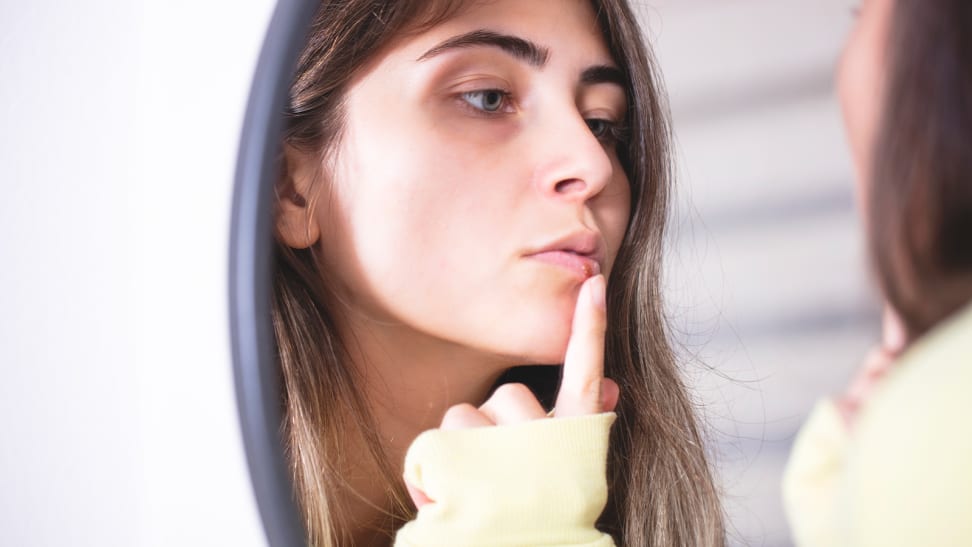What are cold sores—and how do you get rid of them?
Banish these pesky blemishes from your lips.
 Credit:
Credit:
Products are chosen independently by our editors. Purchases made through our links may earn us a commission.
Remember when you were in elementary school and kids spoke about “cooties” with fear and disdain? Well, cold sores are probably the closest thing to cooties you could catch from kissing a crush (sad but true). What’s more, if you’ve ever noticed any pimple-like blemish on or near your lips, it may have actually been a cold sore—yes, they are that common.
To help you understand what cold sores are and how to treat them, we spoke with Dr. Sandhya Deverapalli, a dermatologist with Tufts Medical Center in Boston.
What are cold sores and what causes them?
Cold sores, also called fever blisters, are caused by the contagious, incurable, and extremely common herpes simplex virus, a.k.a. HSV-1. Anywhere from 50% to 80% of American adults have HSV-1, and about 90% of people have been exposed by age 50.
Not everyone gets chronic cold sores (more on that coming) but when they pop up, they typically appear as ulcers or fluid-filled blisters on or around the lips. Once you have HSV-1, it does not leave the body, but instead lies dormant in your system. In fact, you may not necessarily get a cold sore even after initially contracting the virus—anywhere from 20% to 40% of people do. But any number of triggers may "activate" an outbreak and cause a cold sore to form, according to the Cleveland Clinic. Possible triggers include a concurrent illness (such as, yes, a cold), a dental surgery, a facial from an esthetician, sun exposure, your menstrual cycle, or even just stress.
The virus (and therefore cold sores) is spread through close contact, like kissing or sharing a drink. When you’re exposed to someone with someone with the virus, whether they have a cold sore present or not at the time, the herpes simplex virus can “lodge itself into the nerves outlining the lips,” Deverapalli explains. (Don’t worry, you won’t actually feel this happen.)
How can you identify a cold sore?
The first indication that a blemish may be a cold sore is its location: If it’s on or around the lips, that’s telltale, as this is the most common spot for them to appear. Other affected areas may include the cheeks, neck, fingers, toes, or inside the mouth. What you’ll see is a round or misshapen blister or cluster of blisters that appear red and fluid-filled. You may feel a numbness or tingling sensation at the site of the blemish, even before the sore itself arises.
When you first contract the virus, symptoms can be more severe, with pain at the cold sore, a mild fever, and flu-like symptoms. At least 25% of people get recurring cold sores in the same spot following the initial episode. The good news about recurring cold sores: “The patients train themselves into understanding when a cold sore is going to come up and [can] take precautions or other treatment measures when they notice that,” says Deverapalli.
Can you prevent a cold sore?
Ideally, you want to avoid getting the herpes simplex virus by limiting close contact with others but avoiding it may not be realistic, given the commonness of the virus and the fact that it often lays dormant without symptoms to indicate its presence.
If you know you have the virus from having had a diagnosed cold sore in the past, you can take preventative steps for a recurrence by avoiding the aforementioned triggers, in particular by not getting facials, avoiding or reducing sun exposure, and taking steps to mitigate acute stress. Sure, you may not be able to avoid, say, your menstrual cycle or getting a cold, but you can make small but important changes, like wearing SPF to limit sun exposure. In fact, zinc oxide, an ingredient in physical sunscreens, is shown to treat cold sores. And if you feel a cold sore coming on, you can let your doctor know and begin treatment (details below) as fast as possible to shorten your outbreak.
How can you get rid of a cold sore?
The most effective way to treat cold sores is to consult your doctor, who can prescribe an oral antiviral medication. Without treatment, cold sores last an average of seven to 10 days, but a medication can reduce the healing time down to about two days, Deverapalli says. Using home remedies you’ll find online, like toothpaste or tea bags, unfortunately won’t minimize the duration that the cold sore lasts.
Whether or not you use a prescription antiviral, you can treat any pain or discomfort while the cold sore runs its course by applying an ice pack to the area or taking a painkiller, like ibuprofen. You can also seal the sore with petroleum jelly or Aquaphor to soften the scabbing skin as it heals. An over-the-counter topical medication containing docosanol, found in Abreva, was shown to reduce symptoms and healing process by about 18 hours when compared to a placebo in study, according to the World Health Organization. Another OTC, topical benzalkonium chloride, a.k.a. Viroxyn, may reduce the symptoms and was found more effective than Abreva in one study, says Deverapalli. "However, it's not clear as to what extent the pharmaceutical companies may have influenced the study."
The most important thing to remember, Deverapalli says, is that you should contact your doctor if you think you have a cold sore. “There’s a way of making it go away really fast, like within a day or two, and the best way to do it is with oral antivirals and to call the provider when it happens.”


